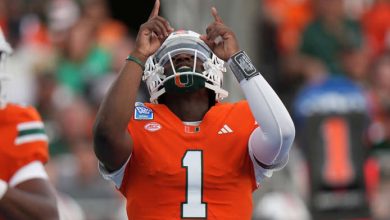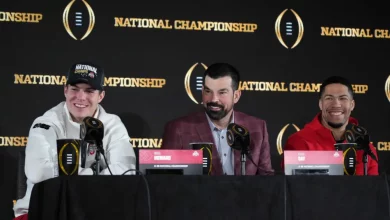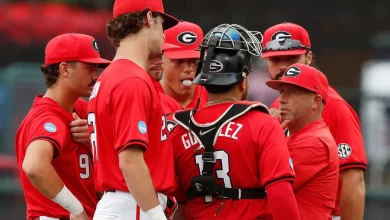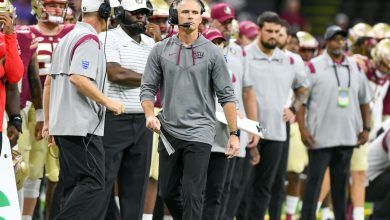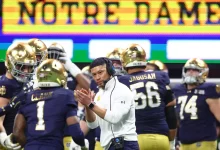Marcus Freeman has emphasized that Notre Dame’s success is built on being an offensive and defensive line-driven program.
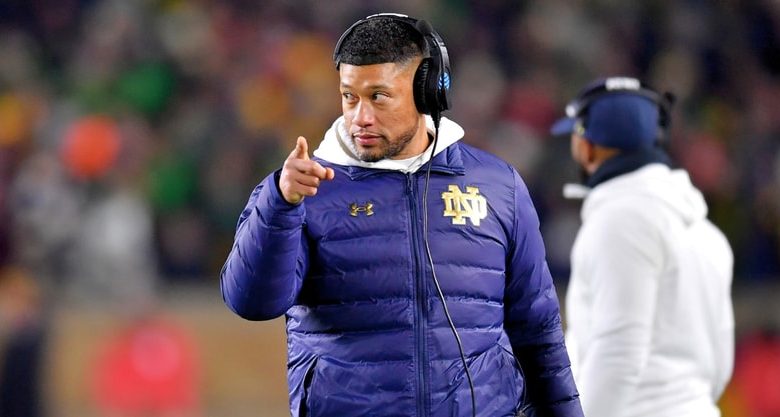
In the world of college football, success is often determined by the teams that control the line of scrimmage. Marcus Freeman, head coach of the Notre Dame Fighting Irish, has consistently stressed that Notre Dame’s identity and long-term success are built upon dominating both the offensive and defensive lines. This approach is deeply ingrained in the history and philosophy of the program, and Freeman’s emphasis on it signals a renewed commitment to returning Notre Dame to the pinnacle of college football.
In his time as head coach, Freeman has made it clear that his vision for the program is grounded in the trenches. “We are an offensive line and defensive line-driven program,” Freeman has repeatedly stated, underscoring that games are won and lost at the line of scrimmage. This philosophy not only reflects Notre Dame’s rich history but also sets the foundation for Freeman’s strategic approach to building a championship-caliber team.
In this article, we will explore the significance of Freeman’s statement, analyze the history of Notre Dame’s line-driven success, and discuss how Freeman is executing this vision to bring the Fighting Irish back to national prominence.
The Role of the Offensive Line in College Football
In modern football, the offensive line plays a central role in a team’s success. While much of the spotlight often shines on the skill positions—quarterbacks, running backs, and wide receivers—the offensive line is the backbone of any successful offense. The ability to control the line of scrimmage, protect the quarterback, and create holes for the running game can make or break a team’s offensive success.
Notre Dame has long been recognized for its elite offensive line play. Throughout its history, the Fighting Irish have developed a reputation for producing some of the best offensive linemen in college football. Under head coach Lou Holtz in the 1980s and 1990s, Notre Dame’s offensive lines were feared for their power and precision, laying the groundwork for a program that consistently competed for national championships.
Even in the 2000s and 2010s, under various coaching regimes, Notre Dame continued to field some of the country’s top offensive lines. Players like Zack Martin, Quenton Nelson, Mike McGlinchey, and Ronnie Stanley are just a few of the names that have represented the Fighting Irish as dominant offensive linemen and gone on to enjoy successful careers in the NFL.
The Defensive Line: Notre Dame’s Forgotten Powerhouse
While the offensive line often gets the most attention, the defensive line is just as critical, if not more so, in establishing the foundation of a team. Freeman, a former defensive coordinator before taking over as head coach, knows firsthand the importance of a strong defensive front. A dominant defensive line can disrupt an offense’s rhythm, create pressure on the quarterback, and stifle the running game. In college football, where offenses are more dynamic than ever, having a ferocious defensive line is often the difference between good and great teams.
Notre Dame has historically produced outstanding defensive linemen as well. In the 1980s, the program boasted standout defensive linemen like Chris Zorich and Frank Stams, who helped lead the Fighting Irish to a national title in 1988. The tradition of outstanding defensive line play has carried through the years, with players like Sheldon Day, Jerry Tillery, and Khalid Kareem continuing the tradition of excellence along the defensive front.
As Freeman takes over the program, he has emphasized the importance of returning to that tradition. The defensive line is the heartbeat of his philosophy, as Freeman understands that a strong defensive front not only stifles opposing offenses but also creates opportunities for the rest of the defense to make plays. With Freeman’s defensive expertise, it’s clear that he understands how to maximize the potential of his defensive line.
The Importance of the Trench Battle in Freeman’s Vision
For Freeman, success is built from the inside out. The trenches, where the game is won and lost, are the starting point for any team’s strategy. As a defensive-minded coach with a background in building elite defenses, Freeman has prioritized building a defensive line that can dominate opposing offenses. However, his vision for Notre Dame goes beyond just defensive dominance.
“We are an offensive line and defensive line-driven program,” Freeman explained. His words reflect a holistic approach to building a balanced, physical team that can compete at the highest levels. Freeman recognizes that a dominant offensive line is just as important as a dominant defensive line. They are the two sides of the same coin, and each complements the other. When one is performing well, it makes the other more effective.
To build a truly successful football program, Freeman has invested heavily in recruiting and developing talent along both lines. The goal is not just to have strong individual players but to develop a deep and cohesive unit capable of executing at an elite level. Freeman believes that having a strong offensive and defensive line is the foundation for achieving consistent success over time.
Recruiting the Trenches: Freeman’s Strategy
One of Freeman’s greatest strengths as a head coach has been his ability to recruit at an elite level. His recruiting strategy, which focuses on identifying and attracting top-tier talent to Notre Dame, is rooted in his understanding of how critical the trenches are.
Freeman’s coaching staff has worked tirelessly to secure commitments from high school players who excel at both the offensive and defensive line positions. This commitment to the trenches has paid dividends, as Notre Dame continues to be a landing spot for some of the best offensive and defensive linemen in the country. The 2023 and 2024 recruiting classes, for example, saw Notre Dame land several top-tier offensive and defensive linemen, signaling that Freeman’s strategy is resonating with top recruits.
The ability to recruit elite players along both lines is crucial for Freeman’s vision of returning Notre Dame to national prominence. By bringing in players who can dominate at the line of scrimmage, Freeman is setting the program up for success in both the short and long term.
Player Development: Building the Next Generation of Notre Dame Linemen
In addition to recruiting, Freeman has emphasized the importance of player development. Building dominant offensive and defensive lines is not just about landing highly ranked recruits; it’s also about developing those players into polished and versatile athletes capable of competing at the highest level.
Freeman’s background as a defensive coordinator provides him with a deep understanding of how to coach players to play at an elite level. As the head coach, Freeman’s primary focus is on helping players develop their skills and understanding of the game, not just as individuals but as part of a cohesive unit. This approach is particularly important for offensive and defensive linemen, who must work together in sync to execute the team’s strategy effectively.
Notre Dame’s offensive line coach, Harry Hiestand, is widely regarded as one of the best in the country at developing linemen. Hiestand’s coaching expertise, combined with Freeman’s vision and leadership, has allowed the Fighting Irish to continue developing some of the best offensive linemen in college football. In fact, Notre Dame’s offensive line has become a cornerstone of the team’s success, regularly ranked among the top units in the nation.
On the defensive side of the ball, Freeman and his coaching staff have worked to cultivate a fierce, aggressive, and disciplined defensive line. Their ability to recruit and develop defensive linemen who can disrupt offenses and create pressure on the quarterback is a critical component of Freeman’s strategy to return Notre Dame to national championship contention.
Building a Championship Program from the Trenches
The ultimate goal of Freeman’s strategy is to build a national championship-contending program. In order to do so, Freeman recognizes that his team must dominate at the line of scrimmage. Whether it’s controlling the ball on offense or stopping the opposition’s attack on defense, success begins in the trenches. Notre Dame’s reputation as an elite team is built on that fundamental truth.
By focusing on the offensive and defensive lines, Freeman is laying the foundation for sustained success. In a sport where games are won and lost on the line of scrimmage, having the ability to consistently dominate both offensively and defensively is a significant advantage. Freeman’s commitment to this philosophy is a major reason why Notre Dame’s recruiting has taken a leap in recent years, and it bodes well for the program’s future.
The Future of Notre Dame Football
As Freeman continues to recruit and develop talent for the future, his emphasis on the offensive and defensive lines will be crucial to Notre Dame’s ability to compete at the highest level. By securing top-tier linemen and continuing to develop them into NFL-caliber players, Freeman is ensuring that Notre Dame will have the physicality and depth needed to compete for national championships year after year.
Freeman’s emphasis on the trenches reflects a broader strategy of building a sustainable program that can compete consistently at the top of college football. With strong recruiting classes and a development-focused approach, Freeman has set Notre Dame on the path to returning to the elite level where the program has historically belonged. Marcus Freeman’s assertion that Notre Dame is an offensive and defensive line-driven program is more than just a catchphrase; it is a guiding principle for how he intends to build a championship-winning team. The offensive and defensive lines are the foundation of any successful football team, and Freeman’s commitment to excelling in these areas speaks to his larger vision for Notre Dame. By recruiting elite talent, developing players at a high level, and emphasizing the importance of the trenches, Freeman is ensuring that the Fighting Irish will remain competitive at the highest level in the years to come. This approach will not only elevate the program but also bring Notre Dame back to the top of college football.



